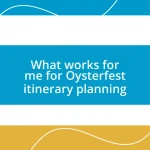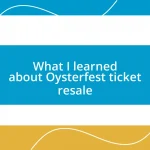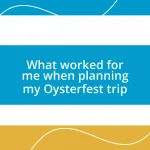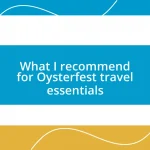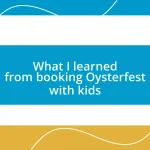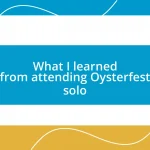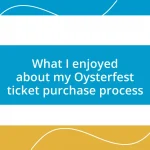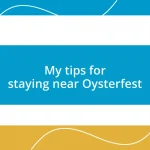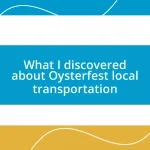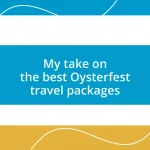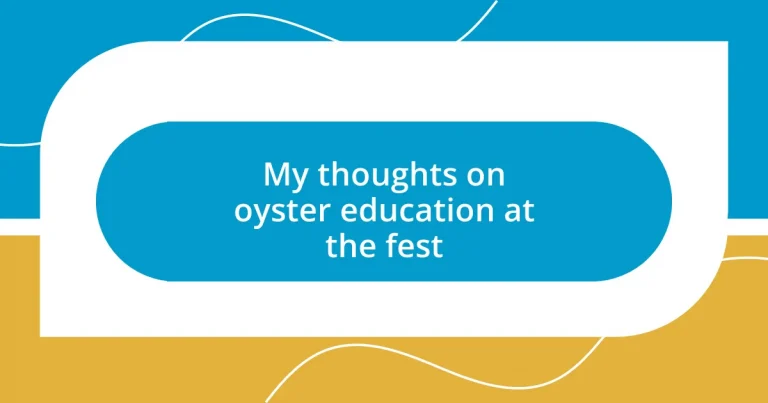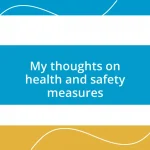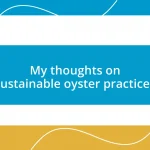Key takeaways:
- Oyster education fosters a connection to marine ecosystems, emphasizing the importance of oysters in environmental conservation, community engagement, and culinary appreciation.
- Engaging learning experiences, such as workshops and marine tours, enhance understanding and foster emotional connections to the subject matter.
- Sharing personal stories and encouraging questions create a dynamic and relatable learning environment, transforming abstract concepts into memorable experiences.
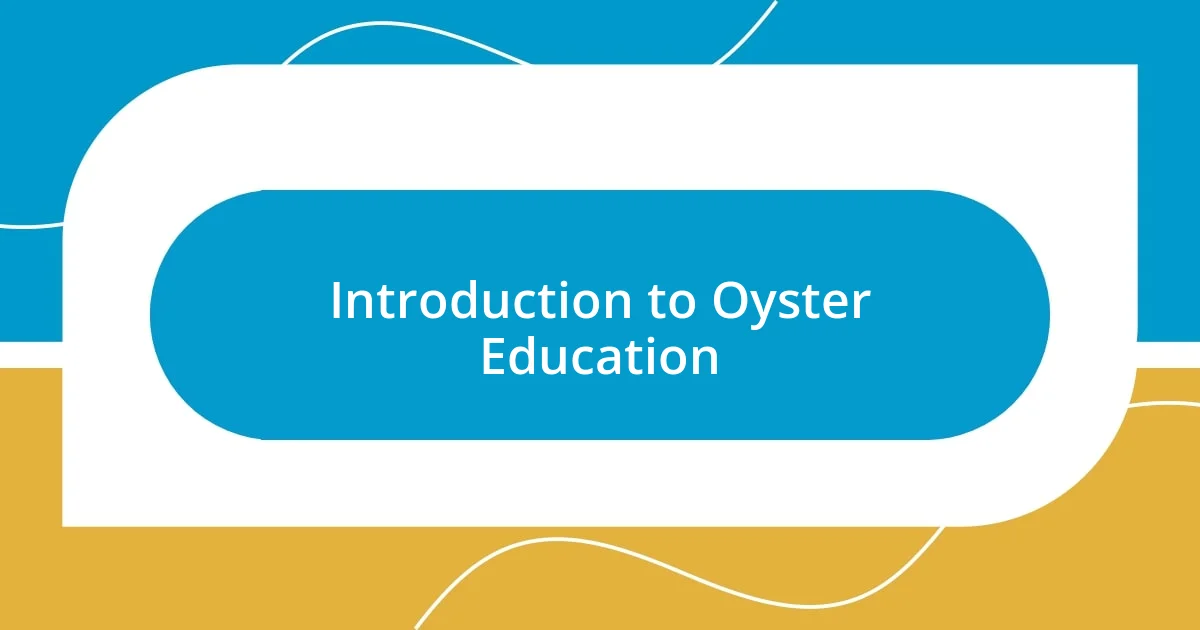
Introduction to Oyster Education
Oyster education is a fascinating journey that combines marine biology, environmental conservation, and culinary delight. I remember my first encounter with the term, and it sparked a sense of curiosity in me—how could something so small have such a profound impact on our ecosystem? Learning about these bivalve wonders opens up a whole new world of appreciation for our oceans and the roles oysters play in maintaining water quality.
One thing that struck me was the community aspect of oyster education; it brings together local fishermen, chefs, and educators, all eager to share their knowledge and passion. I once attended a workshop where a passionate oyster farmer explained the importance of sustainable farming practices. His enthusiasm was contagious, and it made me wonder: how often do we truly consider where our food comes from?
As I delve deeper into this topic, I can’t help but reflect on the emotional connection we can form with our food. Understanding the story behind each oyster creates a richer dining experience, transforming an ordinary meal into a celebration of nature and culture. So, what do you think? Isn’t it time we explored more about the food that sustains us?
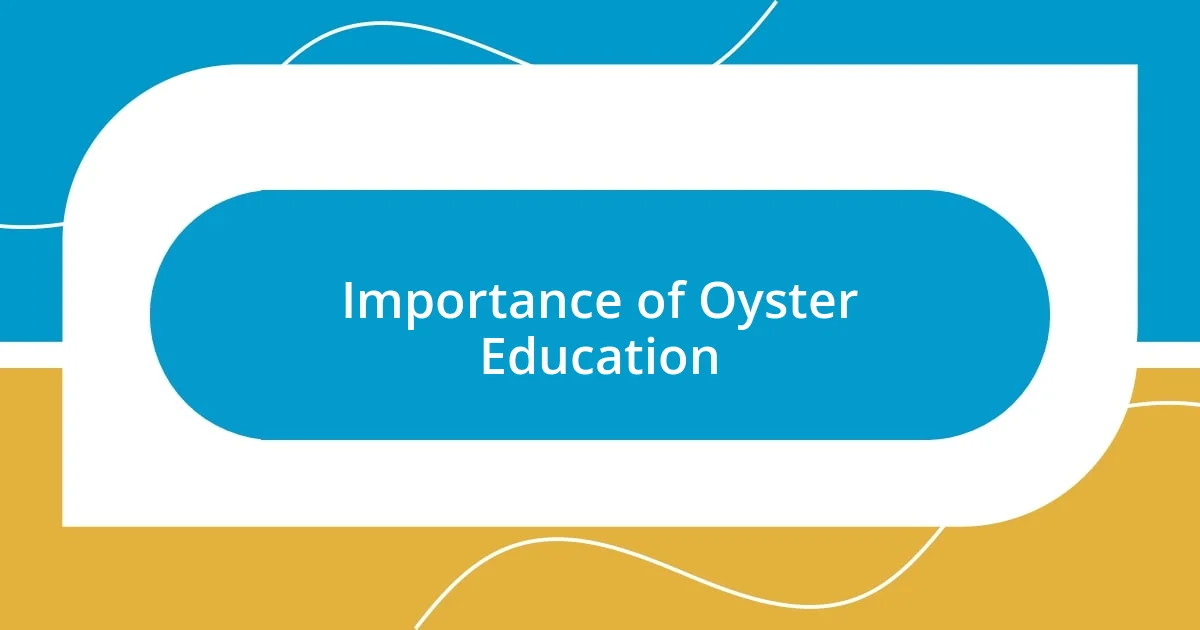
Importance of Oyster Education
Oyster education is essential for fostering a deeper connection to our oceans and enhancing our understanding of aquatic ecosystems. I remember a particular instance when I participated in a coastal clean-up event that highlighted how oyster reefs play a critical role in water filtration and habitat restoration. Witnessing the direct correlation between the health of these ecosystems and our fishing communities made me realize how vital it is to educate ourselves and others about oysters.
Here are some key reasons why oyster education is important:
– Environmental Awareness: Understanding the role of oysters in marine ecosystems encourages advocacy for conservation practices.
– Culinary Knowledge: It helps consumers appreciate the nuances of flavor and preparation, enhancing their overall dining experience.
– Sustainable Practices: Education promotes interest in sustainable farming, supporting local economies while protecting natural habitats.
– Community Engagement: It fosters connections between local producers and consumers, strengthening community bonds and shared responsibility for marine resources.
In my experience, engaging with others who share a passion for this topic can transform both knowledge and enjoyment into advocacy for our oceans.
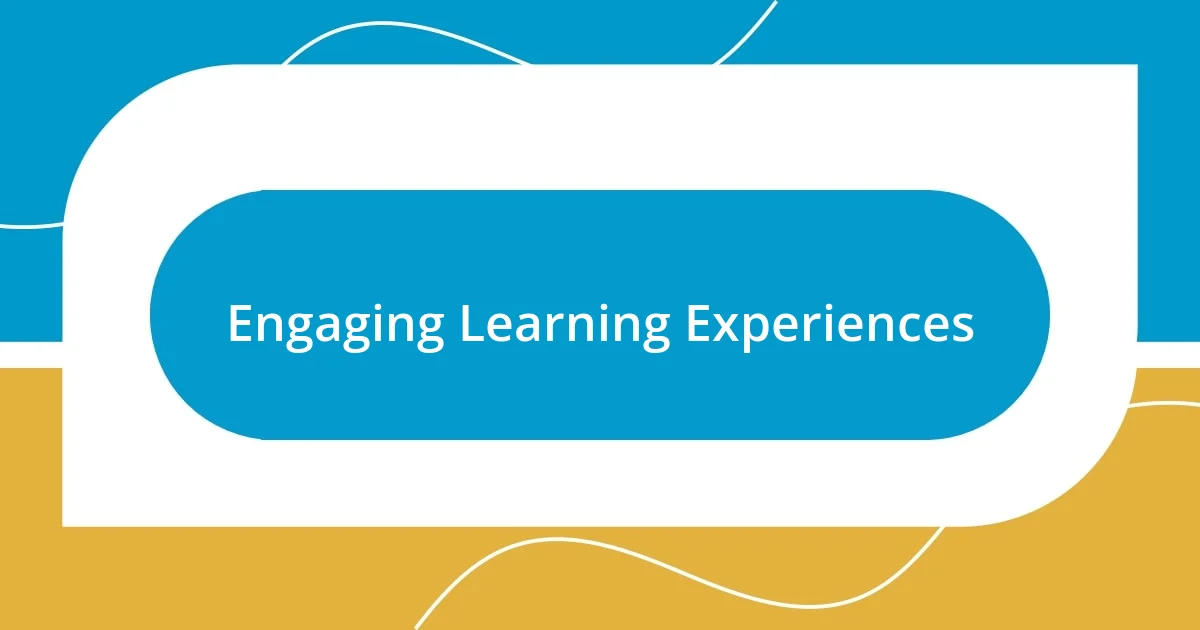
Engaging Learning Experiences
Engaging learning experiences in oyster education can take many forms, from hands-on workshops to immersive culinary classes. I vividly remember participating in an oyster-shucking session at a local festival. The instructor’s excitement was palpable as he taught us the delicate art of opening oysters. It wasn’t just about learning a skill; it was an exhilarating mix of anticipation and wonder that transformed a simple activity into an unforgettable memory. Engaging directly with the subject matter not only solidified my understanding but ignited a passion for oysters that I never knew I had.
Effective learning happens when we immerse ourselves in the subject. I witnessed this during a marine ecology tour, where we observed oyster beds up close. The guide emphasized the vital role these creatures play in the ecosystem, and I could feel the energy shift in the group as everyone began to appreciate the importance of their work. It was enlightening to see how curiosity can drive community awareness and participation. Each interaction deepened my connection to the food we often take for granted and highlighted the joy of shared knowledge.
When learning is interactive, it engages our emotions and encourages connections among participants. I’ll never forget the smell of the ocean air mixed with discoveries made during a beach foraging workshop. Each story shared among attendees created a bond. Hearing others’ experiences enriched my own understanding, transforming mere facts into shared memories and collective enthusiasm for oyster education.
| Type of Experience | Benefits |
|---|---|
| Hands-On Workshops | Fosters skill-building and excitement. |
| Marine Tours | Provides real-world context and enhances appreciation. |
| Culinary Classes | Connects food with culture and community. |
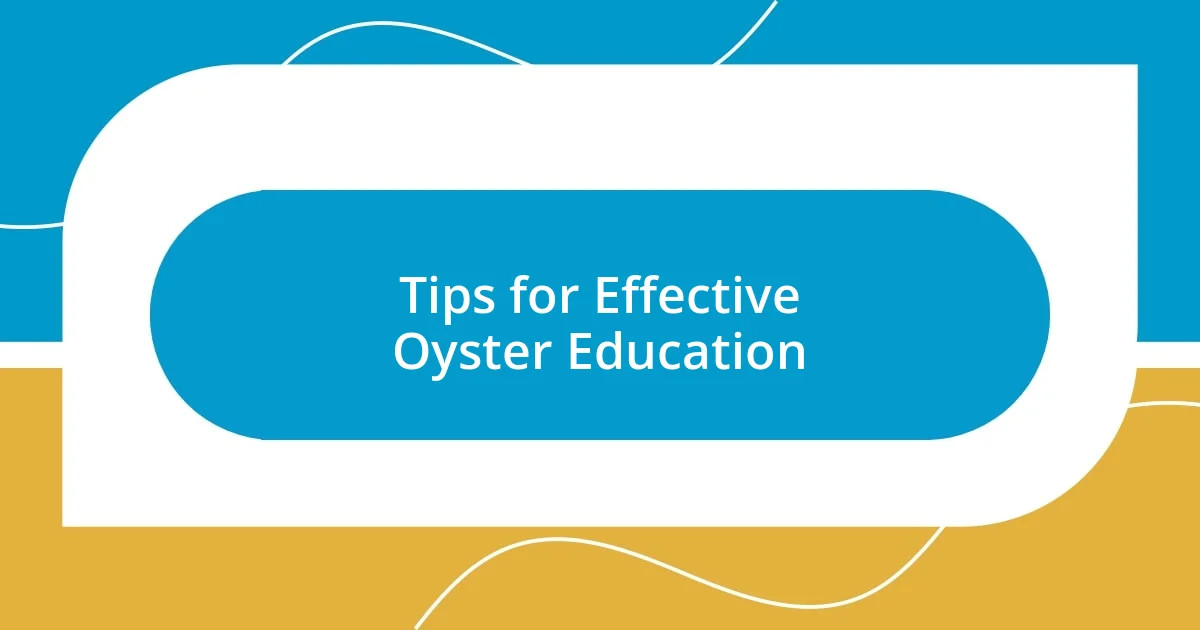
Tips for Effective Oyster Education
One of the most powerful tips for effective oyster education is to share personal stories. I remember chatting with a farmer who operates an oyster farm. He spoke about the pride he felt every time he pulled a fresh batch from the water. His genuine passion was contagious, and it made me realize how powerful firsthand experiences can be. Why not incorporate these narratives into your own teaching? These stories can turn abstract concepts into vivid images, making the facts more relatable and memorable.
Another approach that has proven successful is to incorporate sensory experiences into your lessons. For instance, during a recent oyster tasting event, the sights and smells of the ocean instantly transported me back to warm summer days by the shore. Encouraging participants to engage their senses—by feeling the texture of the shells or tasting different varieties—helps create lasting memories. Isn’t it incredible how a simple taste can evoke emotions and insights about an oyster’s journey from sea to plate?
Lastly, I’ve found that encouraging questions from participants creates a dynamic learning environment. While leading a discussion on sustainable oyster farming, I invited everyone to share their thoughts. The conversation sparked a lively debate about environmental practices and local economies. It was refreshing to see how different perspectives enriched the discussion. So, how can you foster this kind of dialogue in your educational setting? By welcoming inquiries, you not only make the learning experience more engaging but also create a community of curiosity and shared learning.
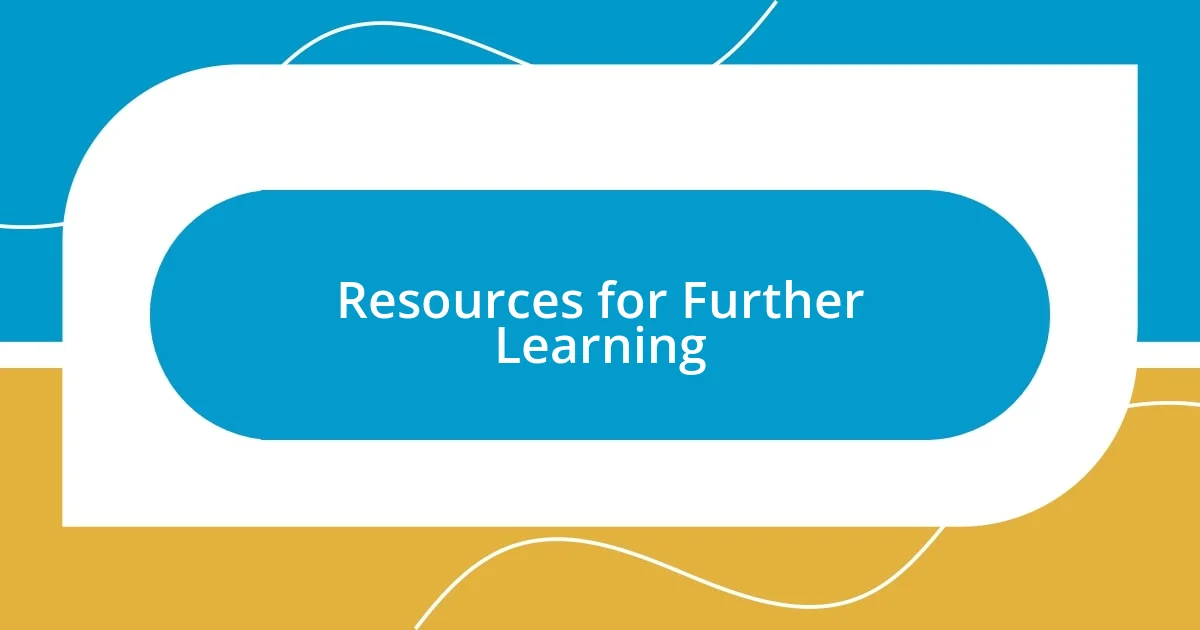
Resources for Further Learning
When it comes to delving deeper into oyster education, there are numerous resources that offer both foundational knowledge and specialized insights. I’ve always found books, such as “The Oyster War” by Summer Brennan, to be a treasure trove of information. Not only does it explore the rich history of oysters, but it also raises questions about environmental policies that affect these beautiful creatures. Have you ever thought about how much our choices impact ecosystems? Reading such books can help you connect the dots between our daily lives and environmental sustainability.
Online courses also provide a fantastic avenue for continued learning. Platforms like Coursera offer programs on marine biology, focusing on topics such as oyster farming and conservation. I remember taking one of these courses; the flexibility it afforded me to learn at my own pace made all the difference. Isn’t it satisfying to expand your knowledge while sipping coffee in your own living room? Plus, many courses encourage interaction among participants, allowing for a rich exchange of ideas that can deepen your understanding even further.
Lastly, engaging with local organizations and attending themed events can be incredibly beneficial. I had the opportunity to join a community group dedicated to promoting sustainable oyster practices. Sharing experiences and participating in local clean-up initiatives not only enhanced my knowledge but also fostered connections with others who share a passion for marine life. Isn’t it amazing how learning can extend beyond the classroom? Investing time in these communal efforts often proves to be as enlightening as the formal lessons themselves.
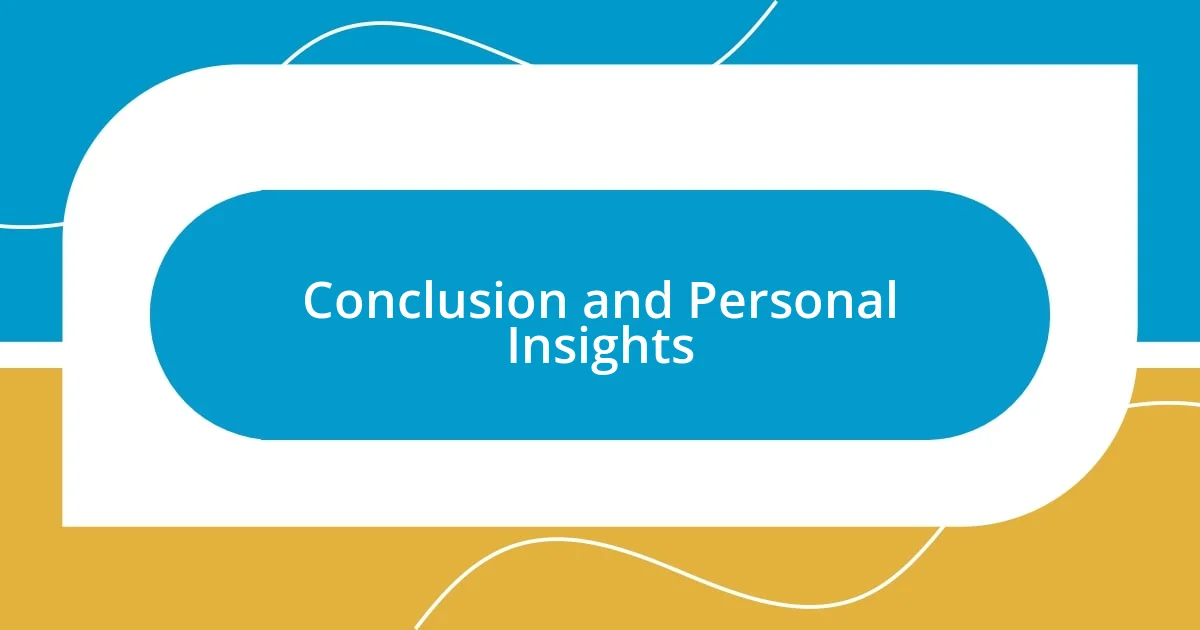
Conclusion and Personal Insights
Reflecting on my journey with oyster education, I can’t help but appreciate the connections I’ve formed. One day, after a workshop, a teenager approached me, eyes wide with curiosity, expressing how much he’d learned about the delicate ecosystem surrounding oysters. His enthusiasm reminded me of my own early days of discovering these fascinating creatures. Isn’t it remarkable how sharing knowledge can ignite a fire of passion in others?
Throughout this experience, I’ve often thought about the overarching significance of education. It’s not just about imparting facts but fostering a deeper understanding of our environment. I recall a moment when a participant shared a personal story about her family’s history with oyster harvesting. It quickly transformed our group into a tight-knit community. Wouldn’t you agree that these shared moments strengthen the fabric of our learning experience?
As I look back, I believe the emotional connections we create through education are as vital as the information itself. I often feel a sense of purpose when teaching about sustainability—it’s fulfilling to know that my efforts might inspire even one person to take action for our oceans. Have you ever experienced that rush of excitement when someone grasps a concept that’s important to you? Those moments are what truly make the journey worthwhile.
